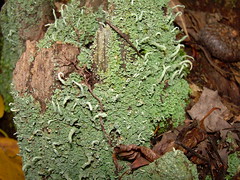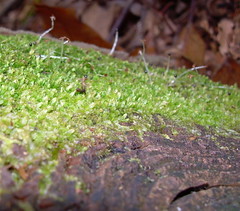Mosses, Liverworts and Lichen
 My daughter, a friend's daughter and I attended a lecture/walk by Dr. Susan Munch on Mosses and Liverworts this past Saturday. This again is one of those things that you think may be incredibly boring. I mean, how exciting can mosses be? Even though I was the one who signed us up, I was dubious. Erin is interested in botany however, so I thought it would be worth the risk and it was only a few dollars to attend. (This one is moss.)
My daughter, a friend's daughter and I attended a lecture/walk by Dr. Susan Munch on Mosses and Liverworts this past Saturday. This again is one of those things that you think may be incredibly boring. I mean, how exciting can mosses be? Even though I was the one who signed us up, I was dubious. Erin is interested in botany however, so I thought it would be worth the risk and it was only a few dollars to attend. (This one is moss.)It was really interesting. Really, it was. First, I had never even heard of liverworts and
 I never really knew what mosses were. I noticed that sometimes they had little "thingys" sticking out of them, but I had no idea what those did or what they were called. Now, we know the difference between mosses, liverworts and lichen and we know the two main parts of them, the gametophytes and sporophytes. We know a few of the ways they reproduce and we've seen a number of specimens in the field and under lenses and microscopes. (This one is lichen.)
I never really knew what mosses were. I noticed that sometimes they had little "thingys" sticking out of them, but I had no idea what those did or what they were called. Now, we know the difference between mosses, liverworts and lichen and we know the two main parts of them, the gametophytes and sporophytes. We know a few of the ways they reproduce and we've seen a number of specimens in the field and under lenses and microscopes. (This one is lichen.)Although Dr. Munch threw all this vocabulary around very fast, she kept it just simple enough so as not to lose us during the slide show. She brought quite a number of specimens and was very good at explaining and pointing out details in them and the examples we saw on our walk. She has just published a kind of field guide called "Outstanding Mosses and Liverworts of Pennsylvania".
 She said she calls these 50 species outstanding because they are the most common of the 350 in Pennsylvania and they can be identified by a layman with a hand lens. Apparently many species cannot be determined unless looking at the cell structure in a microscope. She lives in Berks County and gives various walks and lectures for the public throughout the area. A great person with which to do some fieldlearning! I found that she will be giving this same presentation on November 16th in Lancaster Co. Click here for more info. (This one is a liverwort - note that the top of the sporophyte is spherical.(wink, wink))
She said she calls these 50 species outstanding because they are the most common of the 350 in Pennsylvania and they can be identified by a layman with a hand lens. Apparently many species cannot be determined unless looking at the cell structure in a microscope. She lives in Berks County and gives various walks and lectures for the public throughout the area. A great person with which to do some fieldlearning! I found that she will be giving this same presentation on November 16th in Lancaster Co. Click here for more info. (This one is a liverwort - note that the top of the sporophyte is spherical.(wink, wink))And yes, I'm getting her book. Erin is excited about finding out more about these littlest of plants.




0 Comments:
Post a Comment
<< Home